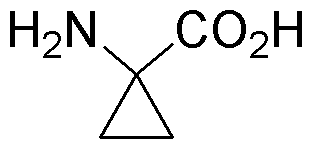1-Aminocyclopropane-1-carboxylic acid is widely utilized in research focused on:
- Plant Growth Regulation: This compound acts as a precursor to ethylene, a vital plant hormone, helping to regulate growth, ripening, and senescence in various crops.
- Post-Harvest Treatments: It is used in the agricultural industry to enhance the shelf life of fruits and vegetables by delaying ripening, which is crucial for reducing food waste.
- Biochemical Research: Researchers employ this compound to study its effects on plant physiology and its role in stress responses, aiding in the development of more resilient crop varieties.
- Pharmaceutical Applications: The compound has potential uses in developing drugs that target plant-related diseases, offering a novel approach to agricultural medicine.
- Environmental Studies: It is used in research examining the impact of ethylene on plant interactions with their environment, contributing to sustainable agricultural practices.
General Information
Properties
Safety and Regulations
Applications
1-Aminocyclopropane-1-carboxylic acid is widely utilized in research focused on:
- Plant Growth Regulation: This compound acts as a precursor to ethylene, a vital plant hormone, helping to regulate growth, ripening, and senescence in various crops.
- Post-Harvest Treatments: It is used in the agricultural industry to enhance the shelf life of fruits and vegetables by delaying ripening, which is crucial for reducing food waste.
- Biochemical Research: Researchers employ this compound to study its effects on plant physiology and its role in stress responses, aiding in the development of more resilient crop varieties.
- Pharmaceutical Applications: The compound has potential uses in developing drugs that target plant-related diseases, offering a novel approach to agricultural medicine.
- Environmental Studies: It is used in research examining the impact of ethylene on plant interactions with their environment, contributing to sustainable agricultural practices.
Documents
Safety Data Sheets (SDS)
The SDS provides comprehensive safety information on handling, storage, and disposal of the product.
Product Specification (PS)
The PS provides a comprehensive breakdown of the product’s properties, including chemical composition, physical state, purity, and storage requirements. It also details acceptable quality ranges and the product's intended applications.
Certificates of Analysis (COA)
Search for Certificates of Analysis (COA) by entering the products Lot Number. Lot and Batch Numbers can be found on a product’s label following the words ‘Lot’ or ‘Batch’.
Numéro de catalogue
Numéro de lot/série
Certificates Of Origin (COO)
This COO confirms the country where the product was manufactured, and also details the materials and components used in it and whether it is derived from natural, synthetic, or other specific sources. This certificate may be required for customs, trade, and regulatory compliance.
Numéro de catalogue
Numéro de lot/série
Safety Data Sheets (SDS)
The SDS provides comprehensive safety information on handling, storage, and disposal of the product.
DownloadProduct Specification (PS)
The PS provides a comprehensive breakdown of the product’s properties, including chemical composition, physical state, purity, and storage requirements. It also details acceptable quality ranges and the product's intended applications.
DownloadCertificates of Analysis (COA)
Search for Certificates of Analysis (COA) by entering the products Lot Number. Lot and Batch Numbers can be found on a product’s label following the words ‘Lot’ or ‘Batch’.
Numéro de catalogue
Numéro de lot/série
Certificates Of Origin (COO)
This COO confirms the country where the product was manufactured, and also details the materials and components used in it and whether it is derived from natural, synthetic, or other specific sources. This certificate may be required for customs, trade, and regulatory compliance.


